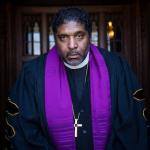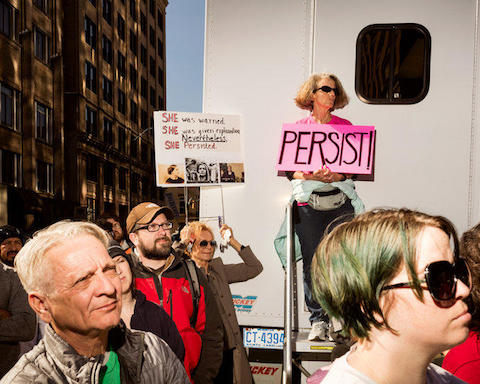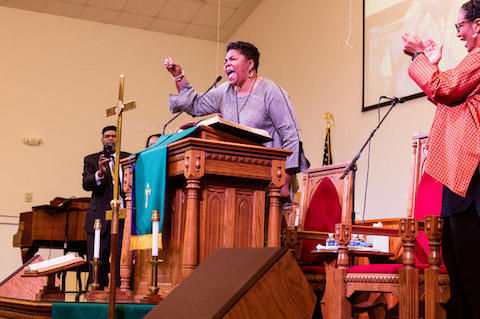Religious Liberals Sat Out of Politics for 40 Years. Now They Want in the Game.

In Nashville, a crowd of ministers carrying palm fronds occupied the governor’s office during Holy Week, demanding the expansion of Medicaid to cover more of the uninsured. In California and 16 other states, an interfaith network has organized thousands of volunteers to swoop into action when immigrants are arrested or houses of worship are vandalized.
Across the country, religious leaders whose politics fall to the left of center, and who used to shun the political arena, are getting involved — and even recruiting political candidates — to fight back against President Trump’s policies on immigration, health care, poverty and the environment.
Some are calling the holy ruckus a “religious resistance.” Others, mindful that periodic attempts at a resurgence on the religious left have all failed, point to an even loftier ambition than taking on the current White House: After 40 years in which the Christian right has dominated the influence of organized religion on American politics — souring some people on religion altogether, studies show — left-leaning faith leaders are hungry to break the right’s grip on setting the nation’s moral agenda.
Frustrated by Christian conservatives’ focus on reversing liberal successes in legalizing abortion and same-sex marriage, those on the religious left want to turn instead to what they see as truly fundamental biblical imperatives — caring for the poor, welcoming strangers and protecting the earth — and maybe even change some minds about what it means to be a believer.
“We’re in a real battle for the soul of faith, of Christianity, of this nation,” said the Rev. Troy Jackson, executive director of the Amos Project, a multifaith social-justice coalition in Cincinnati.
The last time the religious left made this much noise was in protesting the Vietnam War, when the members of the clergy were mostly white men. Now, those in the forefront include blacks and Latinos, women and gays, along with a new wave of activist Catholics inspired by Pope Francis. And they include large contingents of Jews, Muslims and also Sikhs, Hindus and Buddhists in some cities — a reflection of the country’s religious diversity.
Most surprising of all, perhaps, is that religious progressives are being joined at the ramparts by a noticeable number of energized young evangelicals.
Such a loose alliance of people of many faiths, many causes — and no small number of intractable disagreements — may never rival the religious right in its cohesion, passion or political influence. And its mutually standoffish relationship with the Democratic Party, dating to the 1970s, stands in stark contrast to Christian conservatives’ sway over the Republican Party.
But those on the left say that they do not need to mirror the Christian right’s strategic alliance with the Republican Party to gain a healthy measure of political influence — and that they are undaunted by how long it might take.

Supporters listened to Dr. Barber in February at a large march in Raleigh. Credit Jeremy M. Lange for The New York Times
A Fight for the ‘Moral Center’
Late on a Friday three weeks into the Trump administration, the Rev. William J. Barber II was in a Raleigh, N.C., hotel room, talking through his speech for the next day with advisers, including fellow ministers, a Muslim activist and a couple who had marched with the Rev. Dr. Martin Luther King Jr. All confessed they remained demoralized since the election. But they also marveled at the surge in political protests, fueled in part by Christian, Jewish and Muslim activists working together.
Dr. Barber, fighting a flu, smiled broadly. “Rosa Parks didn’t just decide to sit down one day,” he said. “We can’t choose the moment that the flame bursts out, but we can be the kindling.”
He has been piling up sticks for years.
As president of the North Carolina N.A.A.C.P. and pastor of a small Disciples of Christ church in Goldsboro, Dr. Barber began staging “Moral Monday” protests in Raleigh in 2013 to oppose voting-rights restrictions and other policies of the Republican-led state government. The demonstrations attracted thousands of participants and helped defeat the governor in 2016.
Last year, he branched out. Along with the Rev. Traci Blackmon, a well-known supporter of the Black Lives Matter movement, and other clergy members, Dr. Barber trained thousands of activists in 32 states, an effort that continues.

The Rev. Traci Blackmon, pastor of Christ the King United Church of Christ in Florissant, Mo., at a service the day before the march. Credit Jeremy M. Lange for The New York Times
“If we’re going to change the country,” he says, “we’ve got to nationalize state movements. It’s not from D.C. down. It’s from the states up.”
To his admirers, Dr. Barber, a gifted preacher with a big-tent vision, is the strongest contender for King’s mantle. And he invites the comparison. In April, to mark the 50th anniversary of the landmark sermon at Riverside Church in Manhattan in which King denounced the Vietnam War, saying, “I cannot be silent,” Dr. Barber preached against Mr. Trump from the same pulpit and denounced what he saw as pervasive racism across the political right.
“When we see signs of a rising fascism,” he said, “we know that we cannot be silent.” In May, he stepped down from his N.A.A.C.P. post to announce a latter-day version of King’s 1968 Poor People’s Campaign.
“If you think this is just a left-versus-right movement, you’re missing the point,” Dr. Barber said in Raleigh. “This is about the moral center. This is about our humanity.”
Loath to be labeled left-leaning or liberal, Dr. Barber cites the Constitution and the common good as freely as the Bible. “We use the words that progressives have thrown away — morality, welfare, poor, faith — because those are soul words,” he says.
He calls himself an evangelical “who takes seriously the Old Testament and Jesus.” Yet he has fully embraced gay and transgender rights — and in North Carolina, home of the law restricting bathroom use by transgender people. The Bible, he notes, says far more about caring for the needy than it does about homosexuality or abortion.
“How do you take two or three Scriptures and make a theology out of it, and claim it is the moral perspective, and leave 2,000 on the table?” he said. “That is a form of theological malpractice.”
This stance has cost Dr. Barber some allies, including in black churches, but has won him others. Imam Abdullah Antepli of Duke University said he had hesitated to march alongside gay pastors until he realized their struggles were linked.
“We can’t have only Jews cry for anti-Semitism, and Muslims cry for Islamophobia,” Imam Antepli said. “We can only win this if we see it as one big fight.”
The fervor powering that fight could be seen in Raleigh the next day. Behind Dr. Barber, Imam Antepli, two rabbis and a lesbian bishop were some 80,000 people.
Hunched over a cane he has used since his 20s, when he was struck with debilitating arthritis, Dr. Barber took the first step.
“Forward together!” he bellowed, calling for a response.
The crowd supplied it: “Not one step back!”
Tense Ties to Democrats
Just how much ground the religious left must cover before it amounts to a meaningful counterweight to the Christian right was evident last November, when, despite deep concerns, white evangelical conservatives rallied behind Mr. Trump in overwhelming numbers.
Muscle memory alone could have played a part: For nearly four decades, Christian conservatives have coalesced around the Republican presidential nominee, reaching right into the pews to mobilize voters.
Relations between Democrats and religious progressives have been more difficult since 1980, when evangelicals deserted Jimmy Carter — one of their own, whom they had supported in 1976 — for Ronald Reagan.
As Republicans cemented the Christian right as a cornerstone of the party’s base, Democrats moved in the opposite direction, so intent on separating church and state that they recoiled from courting religious blocs of voters, recalled Gary Hart, the former senator, who grew up in the Church of the Nazarene and graduated from divinity school.
During his ill-fated 1988 presidential campaign, Mr. Hart said, he was often asked, “‘Why don’t you talk about your religious background more?’ And the answer was, ‘I don’t want to be seen as pandering for votes.’”
Setting abortion aside, political appeals based on religious beliefs continue to carry risk for Democrats, given the growing numbers of Americans who claim no religion: Secular voters overwhelmingly vote Democratic, and younger voters are far more secular than older voters.
Still, Hillary Clinton’s snub of even moderate evangelicals in the 2016 presidential race squandered many opportunities to cut into Mr. Trump’s support. Where Barack Obama had worked hard in 2008 to show he would at least listen to evangelicals, Mrs. Clinton rebuffed interview requests from evangelical media outlets and signaled leftward moves on abortion rights that helped many conservative voters overcome their doubts about Mr. Trump.
“The fact that one party has strategically used and abused religion, while the other has had a habitually allergic and negative response to religion per se, puts our side in a more difficult position in regard to political influence,” said the Rev. Jim Wallis, the evangelical social justice advocate who founded the Sojourners community and magazine in 1971.
“Most progressive religious leaders I talk to, almost all of them, feel dissed by the left,” he said. “The left is really controlled by a lot of secular fundamentalists.”
If Dr. Barber works from the outside in, Mr. Wallis is the consummate inside player. His Capitol Hill operation is on an upswing, its big new offices bustling with interns plotting social media campaigns like a “Matthew 25 Pledge,” to “protect and defend vulnerable people in the name of Jesus.”
Mr. Wallis counsels lawmakers on applying faith to public policy — as when Representative Joseph P. Kennedy III scolded the House speaker, Paul D. Ryan, a fellow Catholic, for saying it would be an “act of mercy” to repeal the Affordable Care Act. “He and I must have read different Scripture,” Mr. Kennedy, a Democrat, said in a well-watched floor speech.
Others on the religious left are eyeing more direct forays into politics. The PICO National Network, a faith-based community organizing group active in 22 states, is recruiting clergy and lay leaders to run for office next year, said its political director, Bishop Dwayne D. Royster, a former Norristown, Pa., councilman. And not necessarily as Democrats, he added: “We have to make the parties work for us, not us work for the parties.”
Those rooting for a progressive religious revival, mindful of past failures, harbor few illusions that it will be easy.
“The movement never does arrive,” the Rev. Daniel Schultz, who pastors a United Church of Christ congregation in Wisconsin, wrote in a piece on the Religion Dispatches website. “It never arrives because the left (or at least the Democratic Party) is too diverse and its priorities too different for anything like a mirror image of the religious right to coalesce.”
Sister Simone Campbell, a liberal Catholic lobbyist who also barnstormed with Dr. Barber, said the movement’s diversity could be an obstacle, as she discovered in a room full of white Catholics, black Baptists and agnostic Unitarians.
“People are trying to figure out: How do we get traction? But it has not yet jelled,” she said. “So I yell at the Holy Spirit, ‘Hurry up!’”
Responding to a Threat
Religious conservatives have taken notice of the stirrings among liberals. The Rev. Franklin Graham, a Trump supporter, has told audiences in North Carolina to beware of preachers like Dr. Barber who “call themselves progressive,” warning: “It’s just another word for ‘I’m an atheist.’” And Gary L. Bauer, the social conservative leader, said he worried more about nonbelievers than about the religious left, citing what he called its affinity for government solutions to social problems.
Yet opposition to Mr. Trump is plainly catalyzing new alliances of religious progressives — and no other cause has united them more than protecting immigrants and refugees, especially those in their flocks.
In Cincinnati alone, 21 churches have joined a sanctuary coalition, forming teams to respond when immigrants are detained, as one group of ministers did recently when a Guatemalan man seeking asylum was held at a nearby jail.
“I think a big part of why this is happening now is every group feels threatened,” said the Rev. Alan Dicken, a young coalition organizer.
Among the most intriguing participants in these coalitions are evangelical leaders like the Rev. Rich Nathan of Columbus, Ohio, pastor of the nation’s largest church in the evangelical Vineyard denomination, who joined a rabbi and an imam on talk radio to denounce Mr. Trump’s travel ban.
More and more, younger evangelicals are questioning their association with the religious right, Mr. Nathan said: “I don’t know almost any evangelical Christians who feel comfortable with the old evangelical guard. They’re certainly not in my orbit. Millennial Christians are really concerned about social justice.”
And they are keeping busy.
In Cincinnati recently, the sanctuary coalition held a vigil outside a Methodist church with a gay pastor after vandals scrawled anti-gay slurs on its sign. Then a priest sounded an alarm: One of his parishioners, a mother of four who had fled gang violence in Mexico, had been picked up by immigration agents and was about to be deported.
In the end, she was, despite the group’s vigils, petitions and a social media campaign. But Mr. Jackson of the Amos Project, a pastor with Independent Christian Churches, discerned a measure of progress.
“I wish we were not in this place,” he said, “but it’s one of the gifts of this moment. The energy is there, and there’s new, deep relationships that are being forged between clergy and congregations that never existed before.”
